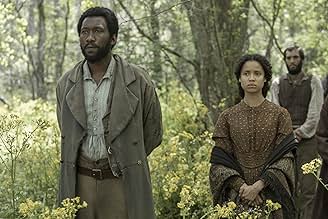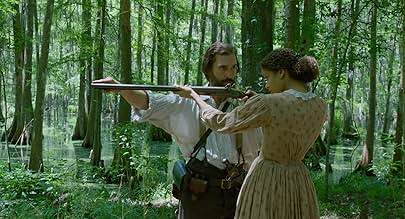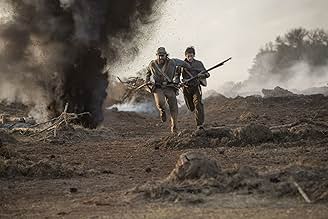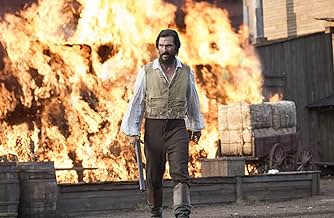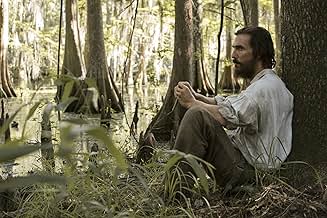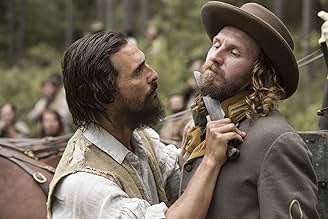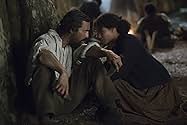Free State of Jones
Un désenchanté désabusé déserteur de l'armée confédérée retourne au Mississippi et dirige une milice de déserteurs et de femmes dans un soulèvement contre le gouvernement confédéré local cor... Tout lireUn désenchanté désabusé déserteur de l'armée confédérée retourne au Mississippi et dirige une milice de déserteurs et de femmes dans un soulèvement contre le gouvernement confédéré local corrompu.Un désenchanté désabusé déserteur de l'armée confédérée retourne au Mississippi et dirige une milice de déserteurs et de femmes dans un soulèvement contre le gouvernement confédéré local corrompu.
- Réalisation
- Scénario
- Casting principal
- Récompenses
- 3 victoires et 4 nominations au total
- Annie
- (as Jessica Collins)
- Wilson
- (as Donald Watkins)
Avis à la une
The phrase "rich man's war,poor man's fight" never had more meaning than in the situation Knight finds himself in. He just walks away from the Confederate army and before long he's heading a movement back home seceding from the seceding Confederacy. Jones County opts for its own independence.
As played by Matthew McConaughey we see Knight certainly a person of humble circumstances who like Abraham Lincoln is a man who recognizes some great moral issues. McConaughey is humble and modest, but overwhelming in his portrayal. This film might get him a trip to the Oscars.
The two women in his life wife Keri Russell and Gugu Mbatha-Raw, the former slave who develops a relationship with McConaughey are also quite moving in their portrayal. Interracial relationships put McConaughey way ahead of his time. There is a modern story of one of his descendants unable to marry because of Mississippi's miscegenation laws post World War II. I'm not sure it was necessary for this film it kind of interrupted the flow of the main plot. In any event it probably deserved its own film.
Down the cast list there is a very moving performance by young Jacob Lofland in the beginning of the film as a young Confederate soldier who with McConaughey also realizes what business has he in a fight to protect some plantation owner's right to have slaves. You won't forget it if you see Free State Of Jones.
And you should see it.
The movie tells of a counter-rebellion in a Mississippi town during the Civil War, and is based on a true story. The film is done in a style that emulates "Twelve Years A Slave", and as such it deals with topics of slavery and secession in a way that is poignant but also constructive.
In fairness, there are a few things that the film could be rightly critiqued for. The opening scenes of the film are fairly gory and filled with wartime violence, but fortunately that does not dominate the movie. As it progresses, the plot of the film does meander a bit, including a fast forward to a scene from some 85 years after the majority of the film that is interspersed throughout the rest of the movie. That technique felt a bit forced at times, but at the end of the film it made more sense why it had been used.
Additionally, the movie tells its main tale over the course of more than a decade, which makes for a bit of an odd cinematic journey--but, in my view, none of these issues are so problematic that they greatly take away from the movie. Rather, what we have here is a film that was desperately trying to be Oscar worthy, and that perhaps pushes the creative envelope a tad bit too far.
But again, there is more good here than bad. The story that the movie has to tell is both engaging and important--engaging in that it captures your attention and makes you care about the subject matter in a captivating way, and important in that it draws attention to historical facts that you probably were not aware of. I know it certainly highlighted some elements of Reconstruction that were new to me.
Regarding acting, this was perhaps not McConaughey's best role, but it's also not his worst. The supporting cast turns out a strong performance, and all in all the movie is well made.
That said, I'm going with 8/10 stars on this one. It's not the best Civil War flick ever made, and perhaps pales in comparison with other recent historical dramas like "Twelve Years" and "The Revenant", but it's nevertheless a great movie that deserves a "Very Good" score.
In the early Civil War battle scenes, he plays a nurse. Knight is not shown mowing down the enemy with impressive, explosive gunfire. Rather, he is shown risking enemy fire in order to save men's lives, or to retrieve and bury the corpse of a boy shot in battle on his first day. My tears flowed freely during these scenes. Later, Knight himself cries after one of his men is hanged. But Knight gets his revenge, an eye-for-an-eye revenge scene that I won't soon forget.
Newton Knight was a white Mississippi farmer. He was the grandson of a slaveholder, but Knight owned no slaves himself. He served in the Confederate army, but deserted in 1862, after serving for almost a year. He was outraged by the Twenty Negro Law, that allowed families who owned twenty slaves to exempt one family member from service for every twenty slaves they owned.
Knight and other deserters formed The Free State of Jones, declaring their loyalty to the Union, and flying the stars and stripes rather than the stars and bars. After the war, Knight worked for Reconstruction and married Rachel, a freed slave woman. His children also married cross-racially. He died in 1922. As might be expected, he is a controversial figure in Mississippi. Fans of the Confederacy denounce him as a traitor. Others celebrate him as one white Southerner who had a conscience and resisted white supremacy.
Newt Knight was clearly someone with a bucketload of charisma. His power inspired men to fight to the death against their own nation. McConaughey radiates charisma in this role. He is masterful and yet intimate. I'd follow this Newt Knight into battle and feel proud to do so.
"Free State of Jones" is receiving negative reviews. It's easy to see why. There is something in this film to anger multiple grievance mongers.
First, race hustlers will hate this movie. Race hustlers want the official story to be that all whites are supremacists and all blacks are heroic. A film that depicts a white man who worked for black rights is taboo. Race hustlers anathematized "Mississippi Burning" and "The Help" for the same reason. Such a shame that the race hustlers' ideological blindfolds make it impossible for them to appreciate great art.
Liberals might hate this film for a couple of other reasons. I don't know if I've seen a movie where almost every scene hinges on how guns are used. Almost everyone is armed, and uses those weapons to keep breathing and to settle disputes. Even little girls have guns and use them heroically. Second amendment fans may love this film. It depicts what they dream of: oppressed citizenry taking up arms to defeat their own government.
In addition to clinging to their guns, these rebels cling to their God and their Bibles. This is one of the most religious American films I've seen in a while. It's an historical fact that Newt Knight was a devoutly religious Primitive Baptist – he didn't drink, for example. The film drives home Knight's Christianity. He is shown in a long scene using a quill to record a birth in his Bible. In one heartbreaking scene, a slave who has been sexually molested survives psychologically by reciting verses from Genesis. "Free State of Jones" practices a muscular Christianity. One eye-for-an-eye scene takes place in a church.
Republicans will be torn about "Free State of Jones." On the one hand, Knight, like many populist leaders, preaches against economic inequality. "No man should be poor just so that someone else can be rich." I can hear theater seats squeak as Republicans head for the exits. Knight's words, though, reflect the facts. Poor white Southerners were sabotaged by the slave economy and they knew it. That's why they deserted.
But Republicans, if they sit through the entire film, will see how the Republican Party was the favored choice of freed slaves in the post-Civil-War era.
There is a narrative problem in the film. The viewer expects "Free State of Jones" to end after the Civil War. I actually began tying my sneakers, readying to leave the theater. But the film keeps going in what feels like an anti-climax. Gary Ross, the filmmaker, wants to make a point: the Civil War was *not* the happy ending. The KKK rose up, and Jim Crow became entrenched. Black men who tried to exercise their right to vote were lynched. This is an important point, but the film should have been better structured so its narrative flow didn't stop before the film itself did.
"Free State of Jones" was clearly made by sticklers for authenticity. Everyone looks dirty and tired. The clothes look like clothes people wore in the nineteenth century. A confederate officer's uniform looks baggy and tacky, not sparkling and admirable. Scenes are shot in lamplight. I loved this aspect of the film, as will Civil War re-enactors.
It may also be a little too quiet and slow moving for some, but the depth to which the film explores obscure American Civil War facts and events, both during and after, makes one curiouser and curiouser to see where it goes.
This is a rare film that you can watch a trailer of, or not, and not have it ruin the film. In fact, it would be very difficult to anyone to write a spoiler for this. It's also something you want to watch from beginning to end, or at least until the credits shift to white text on black. It may not be the ideal theater film, but it definitely is worthy of a hard copy for your book/DVD shelf.
There were a number of Unionist uprisings in the South during the Civil War (a fact that was carefully expunged from my history textbooks, growing up in the South, maybe to justify all the monuments celebrating the glorious Olde South that lurk around public parks and buildings to intimidate black Southerners - I guess). What other purpose could they possibly serve? To celebrate a defeat?
This movie finally points out the obvious: the Confederacy lost the war, but the planter class which owned the Confederacy did their damnedest to win the peace. Instead of being lynched like Mussolini, Confederate leaders returned to their lives, their plantations, just like the war had never happened. Even the slaves they lost were returned to them in the form of unpaid sharecroppers. The misery of the lives of freedmen is one of the strongest images to take away from this film, their alleged freedom snatched from them. No 40 acres and a mule to serve as some form reparation, they went on to endure a century of domestic terrorism at the hand of the KKK.
The movie itself is beautifully and sensitively acted and filmed. There are scenes of great brutality but which are never gratuitous. There are also scenes of great beauty. There are scenes which have enormous relevance to politics in America today where racism is the hallmark of one Presidential candidate and income inequality the hallmark of another.
Claims by the radical left that this movie is about a "white savior" are just silly. If anything, Gary Ross has eliminated most of the real-life incidents which dealt with Newton Knight's own actions on behalf of freedmen, probably to make the film more palatable to the radical left who, like the extreme right-wing can never be satisfied anyway. I do wish the radical left, rather than criticizing well-intentioned liberals like Gary Ross, would attack the real enemy. The State of Mississippi still incorporates the Confederate flag in its state flag... and social justice warriors are quibbling about degrees of "white saviordom"?
Matthew McConaughey hasn't put a foot wrong since Lincoln Lawyer and his performance here is among his best work. American actors are rarely convincing playing period roles but he totally inhabits the role - scraggly beard, greasy hair, terrible teeth and attitude. He looks like the daguerrotype of a tired and desperate Civil War soldier. Gugu Mbatha-Raw has flown too long under the radar: stunningly touching as an early 19th century biracial heiress in Belle and totally believable as a pop star headed for a nervous breakdown in Beyond the Lights, she brings a luminous quality to Rachel a resourceful woman who defined her own path despite the oppression of racist Southern culture.
Mahershala Ali's character won't be found in Prof. Bynum's books. The names of the maroons who fought with the Knight Company have been lost to history, so he is a composite character invented by Gary Ross. His character travels from runaway slave to armed insurgent to voting rights activist in Reconstruction. Ali imbues his character with wit, charm, warmth and extraordinary courage.
Keri Russell is fine in a small role. She gives her heartbroken character dignity and resilience.
Highly recommended.
Le saviez-vous
- AnecdotesIn 2016 a document was discovered in the National Archives which was a request by Newton Knight's company to join the Union Army in 1864. It lends validity to Knight's claims.
- GaffesWhen the plantation owner comes back home after the war and walks through the front door, a thermostat is visible on the wall to his left.
- Citations
Newton Knight: From this day forward we declare the land north of Pascagoula Swamp, south of enterprise and east to the Pearl River to the Alabama border, to be a Free State of Jones. And as such we do hereby proclaim and affirm the following principles. Number one, no man ought to stay poor so another man can get rich. Number two, no man ought to tell another man what you got to live for or what he's got to die for. Number three, what you put in the ground is yours to tend and harvest and there ain't no man ought to be able to take that away from you. Number four, every man is a man. If you walk on two legs, you're a man. It's as simple as that.
- ConnexionsFeatured in The History of Jones County (2016)
- Bandes originalesBeautiful Dreamer
Written by Stephen Foster
Meilleurs choix
- How long is Free State of Jones?Alimenté par Alexa
Détails
- Date de sortie
- Pays d’origine
- Sites officiels
- Langue
- Aussi connu sous le nom de
- Lucha por la libertad
- Lieux de tournage
- Sociétés de production
- Voir plus de crédits d'entreprise sur IMDbPro
Box-office
- Budget
- 50 000 000 $US (estimé)
- Montant brut aux États-Unis et au Canada
- 20 810 036 $US
- Week-end de sortie aux États-Unis et au Canada
- 7 572 206 $US
- 26 juin 2016
- Montant brut mondial
- 25 035 950 $US
- Durée2 heures 19 minutes
- Couleur
- Rapport de forme
- 1.85 : 1
Contribuer à cette page








